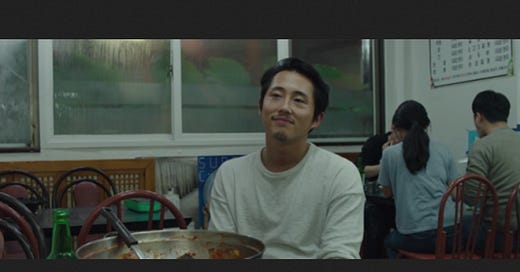It’s hard to forget the garbage excuse of a person running this country, so here are some other weird dudes to distract you instead. I spied in this crop of movies I recently watched a loose, but clear thread running through them. They question and criticize class privilege, what it means to be a man, and the evils of televised media. Wholly fictional, these films are both parts escapist and reaffirming.
The Art of Self Defense
Riley Stearns
Jesse Eisenberg has spent the better part of his career typecast into one of two roles: the effeminate, timid nobody, or the petulant jerkwad, innately formed from his insecurity from once being like the former. This makes him the ideal choice for Riley Stearns sprightly movie that charts the trajectory of American masculinity. In this lowish budget indie, he robs actors of their inflections like Wes Anderson, but for the sake of social commentary in addition to artifice.
Eisenberg treads softly about as another exemplar of dweebdom here defined solely by his deficiency. He is not a likeable loser, an interesting loser or even a weird loser, just a bland broadcloth wuss — until he takes on karate lessons with a suave sensei. He is played by Alessandro Nivola of The Handmaid’s Tale who can now add another puckish, but dangerous authority figure to his repertoire.
The karate teacher and his dojo are host to other violence and padawan Jesse risks becoming the monster he fears and loathes the most. Stearns's conclusion swiftly hoists a sunny order-restoring solution, but the movie still remains infinitely more interesting than other things you’ll watch. Co-starring Imogen Poots (who also gets tangled up in violence with another weakling in Green Room). (Hulu)
RIYL: Jesse Eisenberg most obviously, Fight Club, The Lobster, underdog tales, terrycloth headbands.
A Face in the Crowd
Elia Kazan

Another film about a man becoming a monstrosity. Andy Griffith haunts in his first film role (!) as a southern vagrant, an Arkansas drunk with mean guitar skills. Plucked from a jail by a radio producer named Marcia (Patricia Neal) and propelled to stardom and political futures thanks to his candor, an everyman declaring what he knows and what everyone else is thinking. But beneath his unassailable charm and folksiness, lies something darker. Griffith’s face— boyish-yet-rugged, and his voice— rough-and tumble yet extremely alluring, are perfect canvases for this duality, a seed of the sinister. While it’s billed as a satire, Kazan’s film lands more on the side of melodramatics. By the end, a descent into megalomania occurs precisely with a rise in fame, all made possible and overwhelmingly visible by the television.
RIYL: Woodie Guthrie, Sidney Lumet’s Network, The Sweet Smell of Success, the crash-and-burn second act of a biopic.
Burning
Lee Chang-dong

Redirect any situational uneasiness you’re experiencing towards watching this simmering mystery. You can’t quite place the unmistakable dread on until the very end when it’s too clear what all the signs were pointing at, that it would have only gone this one way, and why did you pretend like it wasn’t going to happen.
Lee Chang-dong is for my money the best contemporary Korean director. Formerly the country’s minister of culture, he has a knack for conveying the agony of life usually through explosive endings, and after toiling for eight years he unleashed this movie about rage and fate, wealth and class, all from taken from a Murakami short story (the most worthwhile thing to come from that writer IMO). Come for Steven Yuen’s stilted Korean and stay for the repurposed Coltrane song. It runs three fraught hours long, but you’ve got the time now. (Netflix)
RIYL: Faulkner, The Conversation, amateur sleuthing, Gatsbian figures and love triangles.
And here’s one deeply non-awful human being.





